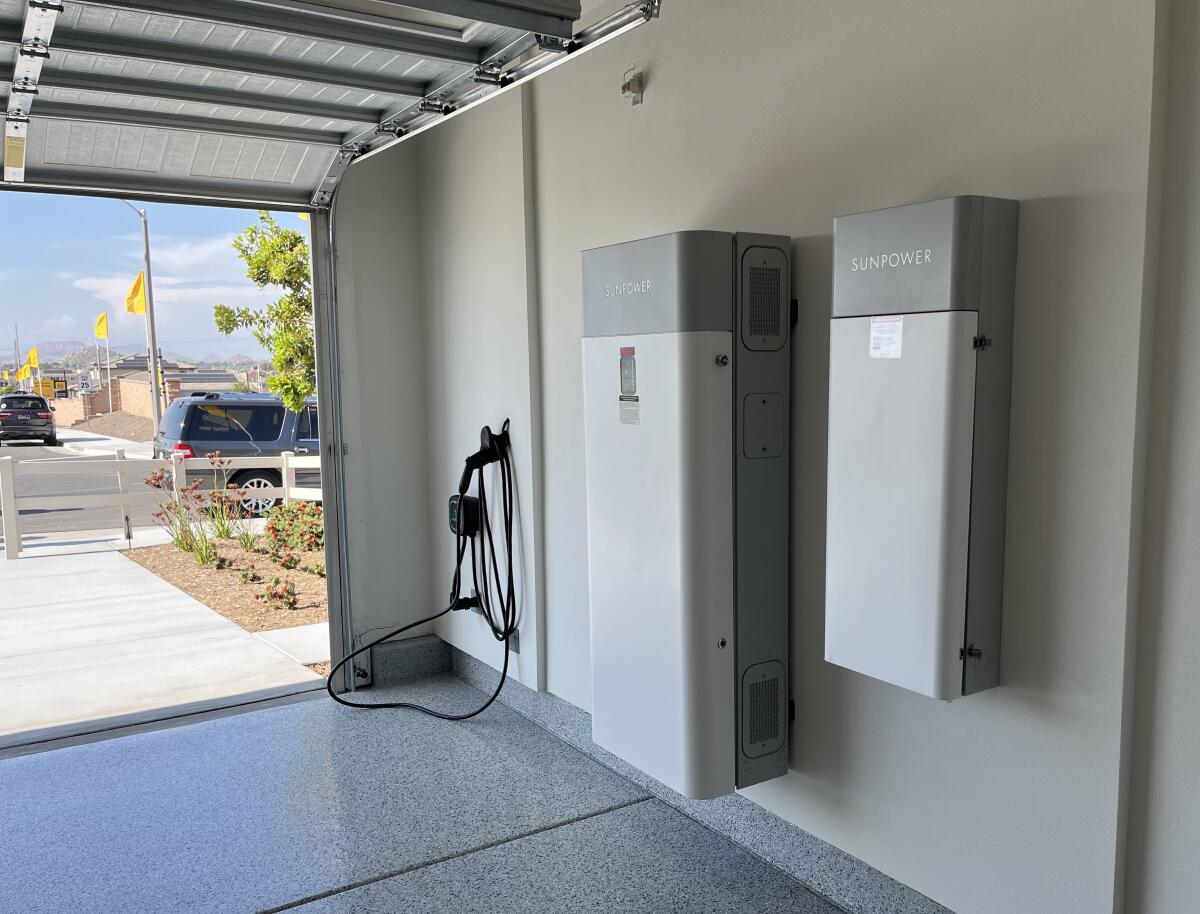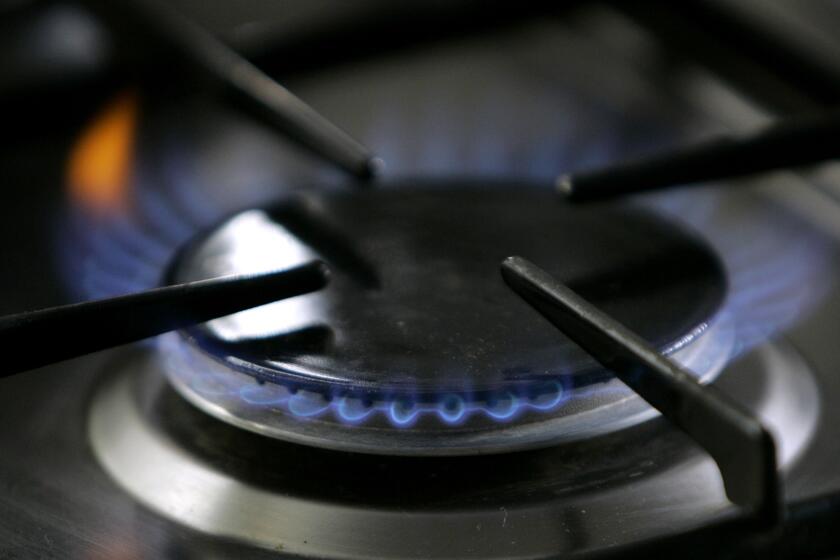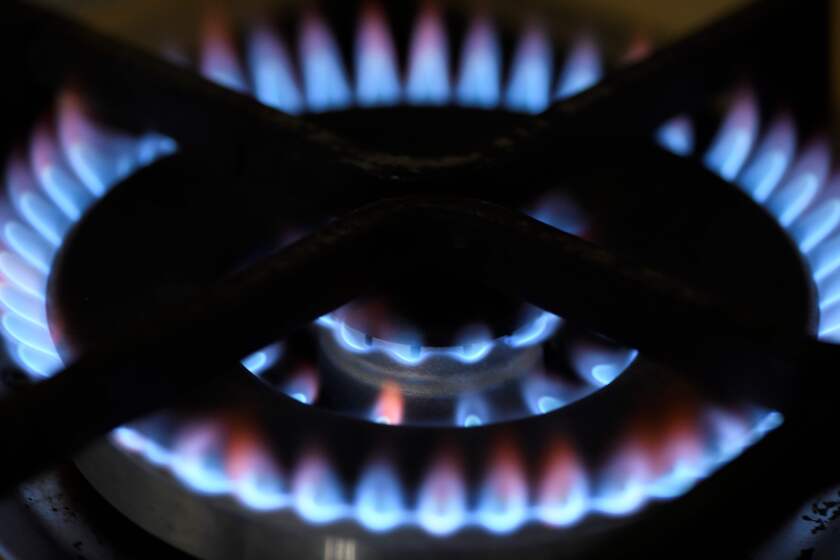Berkeley’s backtrack on gas ban won’t stop the electrification trend

- Share via
Berkeley’s agreement to throw out its first-in-the-nation ban on gas hookups in new buildings after losing a court challenge might seem like a big loss for climate action.
To meet our fossil-fuel reduction goals, after all, we have to stop using natural gas to power furnaces, stoves, water heaters and clothes dryers and switch to electric heat pumps, induction ranges and other zero-emission technology.
All Californians should be able to live in an efficient and non-polluting home even if it wasn’t built for an all-electric world like the new houses in Menifee.
But in reality, the East Bay city’s recent settlement with the California Restaurant Assn. is little more than a bump in the road. The transition to all-electric buildings is so well underway that legal obstacles thrown up by the fossil fuel industry and its allies won’t be enough to stop it. The market is already moving away from gas appliances in favor of electric models. And state and local leaders still have a lot of other tools at their disposal to accelerate that trend.
Industry data show heat pumps outsold gas-fueled furnaces in the U.S. for the second year in a row in 2023. The popularity of these dual-purpose appliances, which provide both heating and air-conditioning, is only expected to grow in the coming years as more Americans take advantage of generous rebates and tax credits under the federal Inflation Reduction Act.
Industry scored a win against local gas bans that have helped California cities stop the expansion of fossil fuel infrastructure.
Perhaps people are waking up to the fact that gas stoves and other fossil-fueled appliances in buildings degrade indoor air quality, are responsible for about 10% of California’s greenhouse gas emissions and generate four times as much smog-forming pollution as the state’s gas power plants. They may also be responding to the reality that heat pumps and induction stoves are more efficient technology that can make homes more comfortable while saving time and money.
Berkeley’s trend-setting 2019 ordinance banned gas piping in new buildings and was followed by dozens of other cities across the state that passed a range of ordinances discouraging gas hookups or encouraging all-electric construction. Last year, the U.S. 9th Circuit Court of Appeals ruled in favor of the restaurant industry lobbying group, holding that Berkeley’s gas ban is preempted by the federal Energy Policy and Conservation Act, which was enacted in 1975 to establish energy efficiency standards for appliances and prohibits state and local governments from setting their own standards. In January, the court denied the city’s petition to rehear the case.
Running out of options, Berkeley settled last week, agreeing to halt enforcement of its ordinance and eventually repeal it. The restaurant industry lobbying group is now urging every city and county in the state that passed a similar ordinance to toss theirs too.
New York just became the first state to ban gas hookups from new buildings to fight climate change and air pollution. What’s preventing California from doing the same?
But the impact is not as sweeping as it might seem. Not all local measures to discourage gas piping in new construction are subject to the decision because some weren’t copies of Berkeley’s ordinance or as prescriptive. And the ruling was narrow enough that there are other options to reach the same goal, including adopting more stringent energy performance standards for buildings and emissions rules for appliances.
Some cities, such as San Luis Obispo, stopped enforcing their gas bans and all-electric building codes after last year’s ruling and and are pivoting to measures that encourage electrification using energy efficiency standards. Cities and counties across the state can copy that approach and pass “fuel neutral” ordinances, which require buildings to meet tougher performance standards regardless of whether they use natural gas or electricity. Those standards will be easier to meet with electric heat pumps and induction stoves because they are up to three times more efficient than their gas-fueled counterparts.
Berkeley, too, should be able to craft a new ordinance that passes legal muster and advances its goal of becoming a fossil fuel-free city. While city officials have been circumspect given the ongoing case, Mayor Jesse Arreguín said in a statement to the editorial board that “the ruling leaves open many policymaking avenues for Berkeley to address environmental and public health hazards within its borders.”
Editorial: California can’t let big polluters win by undermining climate change disclosure laws
Gov. Gavin Newsom signed laws making California the first state to require big companies to disclose greenhouse gas emissions. Now he seems to be undermining them. What gives?
It’s not surprising that industries whose business models are threatened by the move away from natural gas have pushed back against efforts to limit natural gas hookups in California. About three-quarters of California homes use gas for heating and cooking that is piped in with extensive infrastructure that for decades was advantaged through official policy, including incentives for builders to expand the the natural gas system. But California building codes no longer favor natural gas, and regulators last year eliminated the last remaining subsidies for new construction using gas infrastructure.
And a few days ago the California Energy Commission released a proposal to set tougher energy efficiency standards starting in 2026. They will result in the vast majority of new construction being equipped with electric heat pumps, experts say, that will most easily meet the requirements for space and water heating.
With more progress than setbacks, it’s clear that gas appliances are on the way out in California one way or another. For the sake of pollution-plagued communities and future generations’ right to a safe climate, state and local officials should do all they can to make it happen quickly.
More to Read
A cure for the common opinion
Get thought-provoking perspectives with our weekly newsletter.
You may occasionally receive promotional content from the Los Angeles Times.













